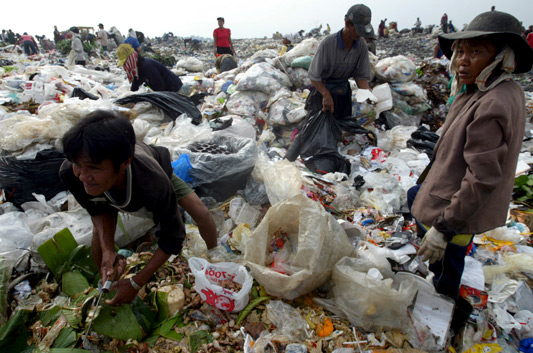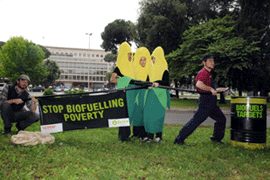UN urges action on food crisis
People in the West get more obese while millions starve, UN food agency chief laments.

 |
| The UN wants help for the world’s poor to cope with the highest food prices in 30 years [EPA] |
Billions of dollars are being wasted on feeding obese people in the West while millions starve around the world, Jacques Diouf, the United Nations food agency chief, has told world leaders at a summit on food security in Rome.
“No one understands… how over-consumption by obese people in the world costs $20bn each year,” Diouf said.
On top of this, there are “$100bn in indirect costs resulting from premature deaths and associated diseases.”
| Global food crisis |
|
Global rice stocks have halved since hitting a record high in 2001 while demand is continuing to rise In Asia, rice prices have almost tripled this year alone Financial speculators, rising populations, floods, droughts, increased demand from developing countries, and removing crops from the food chain to produce biofuels have been cited as factors Price rises have led producing nations to enforce export restrictions, further putting the squeeze on supply, especially in countries relying on imports |
Speaking at the opening of the three-day UN Food and Agriculture Organisation (FAO) summit in Italy’s capital, Diouf also highlighted how an estimated $1.2 trillion was spent on weapons in 2006 while aid to agriculture fell by more than half, from $8bn in 1984 to $3.4bn in 2004.
“In real terms, the share of agriculture in public aid to development has fallen, from 17 per cent in 1980 to three per cent in 2006,” he said.
Recent food riots “are but the chronicle of a catastrophe that was foreseen,” Diouf, whose agency has been harshly criticised, said.
Diouf lamented the failure to reach a goal set by the 1996 world food summit in Rome of reducing the number of hungry people in the world by half by 2015.
“With current trends, the summit’s goal will be attained in 2150 instead of 2015,” he said.
“The international community reacts, unfortunately, only when the media bring into the living rooms of wealthy countries the sad spectacle of those who suffer in the world.”
Concrete plan
Ban Ki-moon, the UN secretary-general, pressed nations at the summit to ease a wide variety of farming taxes, export bans and import tariffs to help millions of the world’s poor cope with the highest food prices in 30 years.
He also urged the US and other nations to phase out subsidies for food-based biofuels, including ethanol, that have been used to encourage farmers to grow crops for energy use rather than human consumption.
The UN chief wants donor nations to develop a concrete plan to revitalise and redirect the global response to hunger.
A UN official in New York, speaking on condition of anonymity, said: “What we are looking for is at least an agreement on how to deal with the issue of biofuels and subsidies that is not detrimental to the needs of poor people.”
Ban’s recommendations are contained in a 38-page draft report presented at the summit by the UN task force that he created to deal with the food crisis.
It could cost $15bn to implement, according to preliminary figures with governments, donors, UN agencies and the World Bank all contributing, officials said.
Task force recommendations
The task force’s draft report contains two sets of recommended actions – one responding to immediate needs, the other to longer-term needs.
 |
|
The World Bank says rising prices are pushing |
In the short term, Ban plans to urge the US and other developed countries to negotiate an agreement with poorer nations to scale back on agricultural tariffs that hurt struggling, subsistence farmers.
He will also call for targeted subsidies so that poor farmers can increase their pension payments and buy more fertiliser and seeds.
In the long term, he hopes to increase farm production by boosting investment in agriculture, irrigation and roads, the UN officials said.
The task force has the backing of UN food agencies and major players such as the World Bank and the International Monetary Fund.
Paul Risley, a spokesman for the World Food Programme in Bangkok, told Al Jazeera that action was needed as high populations will create a huge challenge in feeding the world’s poor.
“At the very least this will require a second green revolution – some attempt to revolutionise the way we grow crops and the way that those crops are available, not just to people who can pay for them, but also, most importantly, to those who don’t have access to money,” he said.
Biofuels resistance
The biofuels proposal is already meeting resistance.
| In video | ||
|
On Monday, three biofuels trade group leaders from the US, Canada and Europe wrote to Diouf to protest against the wording of the UN plan.
“There is no question that the escalating prices for food require serious attention and action by the world’s leaders,” the trade leaders wrote.
“It would be highly precipitous, however, for the United Nations or other international bodies to single out biofuels as the major cause for escalating food prices and take actions that might lead to even higher food prices.”
World prices for food are expected to fall from current peaks in the coming years, but will remain “substantially above” average levels from the past decade, according to a joint agricultural report issued by the FAO and the Organisation for Economic Co-operation and Development.
Price rises are being blamed on high oil prices, changing diets, urbanisation, expanding populations, flawed trade policies, extreme weather, growth in biofuels production and speculation.
 |
| The diverting of crops for biofuels is one reason cited for soaring food costs [AFP] |
People have protested and riots have broken out from Africa to Asia, raising fears that millions more will suffer from malnutrition.
The lead-up to the summit has been clouded by the planned attendance of Robert Mugabe, Zimbabwe‘s president, which sparked condemnation from Australia and Britain.
Stephen Smith, Australia‘s foreign minister, called Mugabe’s presence in Rome “obscene”, saying: “This is the person who has presided over the starvation of his people. This is the person who has used food aid in a politically motivated way.”
The scheduled presence of Mahmoud Ahmadinejad, Iran‘s president, has also generated controversy.
The Israeli ambassador to Italy, Gideon Meir, said on Monday that “it was inopportune to invite him, since it gives him a forum to speak in and to shake hands with other leaders”.

